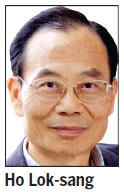July 1 rally and HK people's aspirations
Updated: 2014-07-02 08:43
By Ho Lok-sang(HK Edition)
|
|||||||||
Since the handover of sovereignty Hong Kong people have continued to enjoy the lifestyle they are used to. Freedom of expression, in particular, whether through articles in the press on the radio or on television, or through rallies in the streets, has been upheld. As long as it stays within the bounds of the law, the freedom of expression has been fully respected and protected by the government. Many Hong Kong people are now used to marching in the streets in protest on July 1, the day of establishment of the HKSAR, and they can rest assured that as long as their actions stay within the law no one is going to trouble them. This July 1 was is no exception. Hundreds of thousands of Hong Kong people took to the streets demanding this and that. However there does seem to be something awfully wrong in Hong Kong. What is it?
One complaint I heard recently was this: "Hong Kong has changed. It is no longer the Hong Kong I used to know." The complainant said this with an air of helplessness.
If there is anything seriously wrong, it has to be the erosion of some of Hong Kong's core values. In an earlier article in this column, I crystallized some of Hong Kong's core values as the following:
- A Commitment to fair play
- Respect for the rule of law and the independence of the judiciary
- Freedom of expression
- Respect for our heritage
- Responsibility and accountability for all public office holders
- Equality of opportunity to develop and realize ones potential

Since the handover, we have seen the establishment of the Equal Opportunities Commission, and as recently as last year the enactment of the Competition Law, in both instances, following considerable debate. "Fair play" of course cannot be ensured simply through such changes, but the changes do signal improvements.
Respect for the rule of law and the independence of the judiciary in Hong Kong have been held to be of utmost importance by the SAR government and the central government. The recent white paper on the practice of "One Country, Two Systems" reaffirmed this. However, there seem to be increasing numbers of Hong Kong people who would quite happily trample on the rule of law even while saying that the rule of law is of great importance. The 700,000 who "voted" in favor of civil nomination of the Chief Executive, in glaring contrast to the Basic Law, is a case in point.
Freedom of expression continues to be protected under the law, and that is exactly why the SAR Government has tolerated criticisms, even when unjust. Unfortunately an increasing number of people seem happy to disregard the rights of others to their own freedom of expression; happy to condemn those not holding their own views and shouting others down with little hesitation in open forum.
Respect for heritage has certainly improved since the handover. During the colonial days historical buildings were routinely demolished. Today we have a system of classifying and protecting monuments under the Antiquities and Monuments Office. We have devoted unprecedented resources to promote the preservation of our heritage. Nevertheless preservation and development are always controversial, and it is impossible to please everybody.
Freedom of the press in the SAR, as well as the government's own governance mechanisms, through agencies such as the ICAC and the Ombudsman's Office, have resulted in improved accountability within government bodies and the public sector. The press meanwhile, according to polls, has come under increasing criticism for its loss of credibility.
All the aforementioned would suggest that Hong Kong is moving towards becoming a more civilized society amid controversy and embroiling public debates. This is as things should be, Hong Kong being a pluralistic society. However, what worries many observers, this author included, is the animosity and uncompromising attitude of some groups against those who do not subscribe to their points of view. This self-righteous attitude is the most dangerous culture currently shaping up in Hong Kong.
Who gives them the right to trample on other people's rights in the name of justice? A slogan seen at the July 1 Rally was "Defend Hong Kong's Autonomy; Fear Not Intimidation by the Communist Party; Support Civil Nomination; End Functional Constituencies." But who is intimidating the central government with Occupy Central? Who is trampling on the law and on the civil human rights of others? Where is the evidence that their view is the "main-stream" Hong Kong view?
I remain hopeful that the "main-stream" aspirations of Hong Kong people for a civilized, open society remain intact. It is imperative that the rest of us remain committed to these values and aspirations, regardless of how vocal and intimidating some people in Hong Kong have become.
The author is director of the Centre for Public Policy Studies at Lingnan University.
(HK Edition 07/02/2014 page9)